
Double Dragon is a beat 'em up video game series originally developed and published by Technōs Japan. It began with the release of the arcade game Double Dragon in 1987. The series features twin martial artists, Billy and Jimmy Lee, as they fight against various adversaries and rivals.
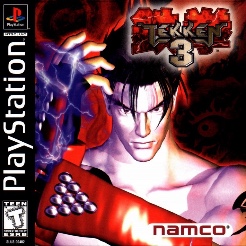
Tekken 3 (鉄拳3) is a fighting game, the third entry in the Tekken series. It was released to the arcades in 1997, before being ported to the PlayStation in 1998. The arcade version of the game was released in 2005 for the PlayStation 2 as part of Tekken 5's Arcade History mode. The game was also re-released as part of Sony's PlayStation Classic.

Before Crisis: Final Fantasy VII is an action role-playing video game developed by Square Enix and originally released for the FOMA mobile service on September 24, 2004. It was later released for SoftBank Mobile and EZweb in 2007. Before Crisis is a prequel to the 1997 video game Final Fantasy VII and forms part of the Compilation of Final Fantasy VII, a metaseries expanding on and continuing the story established in Final Fantasy VII. It takes place six years prior to the events of Final Fantasy VII and focuses on the adventures of the Turks, a group of covert operatives working for the Shinra Electric Power Company, and their fights against both rebel group AVALANCHE and their corrupt employers.
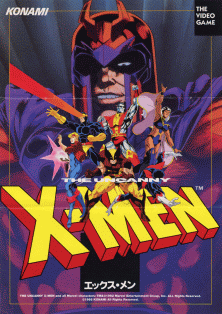
X-Men is a side-scrolling beat 'em up game produced and released by Konami for arcades in 1992, based on the Marvel Comics superhero team of the same name. The in-game character designs are based on the 1989 cartoon X-Men: Pryde of the X-Men. In the game, up to six players control the X-Men to defeat their archenemy Magneto. The six-player version of the game utilizes two screens housed in a deluxe cabinet. It was one of the top five highest-grossing dedicated arcade games of 1992 in the United States, while the Amusement & Music Operators Association (AMOA) nominated it for the "most innovative new technology" award.

Dungeons & Dragons: Shadow over Mystara is an arcade game developed and published by Capcom in 1996 as a sequel to Dungeons & Dragons: Tower of Doom. The game is set in the Dungeons & Dragons campaign setting of Mystara.

Dungeons & Dragons: Tower of Doom, published in 1994, is the first of two arcade games created by Capcom based on the Dungeons & Dragons tabletop role-playing game and set in the Mystara campaign setting. It is a side scrolling beat 'em up with some role-playing video game elements for one to four players. The game was also released on the Sega Saturn, packaged with its sequel, Dungeons & Dragons: Shadow over Mystara, under the title Dungeons & Dragons Collection, although the Saturn version limited the gameplay to only two players. In 2013, both games were re-released for modern platforms as Dungeons & Dragons: Chronicles of Mystara.
A beat 'em up is a video game genre featuring hand-to-hand combat against a large number of opponents. Traditional beat 'em ups take place in scrolling, two-dimensional (2D) levels, while a number of modern games feature more open three-dimensional (3D) environments with yet larger numbers of enemies. The gameplay tends to follow arcade genre conventions, such as being simple to learn but difficult to master, and the combat system tends to be more highly developed than other side-scrolling action games. Two-player cooperative gameplay and multiple player characters are also hallmarks of the genre. Most of these games take place in urban settings and feature crime-fighting and revenge-based plots, though some games may employ historical, science fiction or fantasy themes.

Gradius Gaiden is a 1997 horizontal-scrolling shooter video game developed and published for the PlayStation by Konami. Players control one of four different starships in their mission to eradicate the Bacteria army from destroying the planet Gradius. Gameplay involves shooting down enemies, avoiding their projectiles, and collecting power capsules to unlock access to new weapons. It is the fourth mainline entry in the company's Gradius franchise, and the second to be produced specifically for a home console.

Panzer Bandit is a video game developed by Fill-in-Cafe and published by Banpresto for the PlayStation in 1997 and for PlayStation Network in 2011, exclusively in Japan.
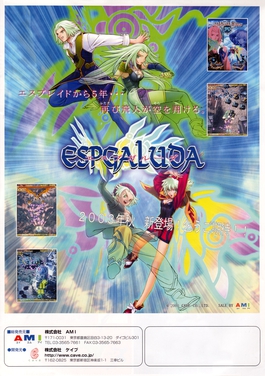
Espgaluda is a 2003 manic shooter by Cave and published by AMI. It is the spiritual successor to ESP Ra.De. and is followed by Espgaluda II.

iS: internal section is a video game developed by Positron and published by Square and released in 1999.
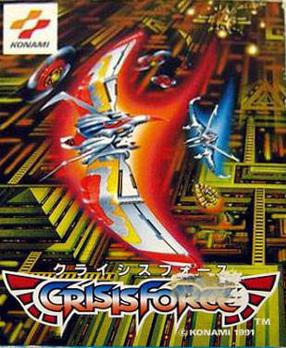
Crisis Force is a 1991 vertically scrolling shooting game released by Konami in Japan for the Family Computer. The player controls one of two fighter ships piloted by Asuka and Maya, a pair of twin siblings descended from the ancient civilizations of Mu, who must save the world from a breed of artificial monsters from the lost civilization of Atlantis. The main feature of the game system is the player's ability to transform its ship in one of three different forms, each with its unique attack method.

Dragon Knight 4 (ドラゴンナイト4) is an erotic role-playing video game developed by ELF Corporation and released only in Japan for several platforms between 1994 and 1997. In 1994, the game first became available for PC MS-DOS, NEC PC-9801 and X68000, with a censored version ported to the Super Nintendo Entertainment System in 1996 and later to the PC-FX, PlayStation and Sega Saturn in 1997. It was also adapted into illustrated novels and an anime miniseries.

Speed Power Gunbike is an action video game for the PlayStation, released exclusively in Japan on April 23, 1998, from publisher Sony Music Entertainment Japan. It is the first game developed by Inti Creates, a group of designers with similar goals and interests who had recently broken off from Capcom. The game was heavily inspired by science fiction anime of the 1980s.
Resogun is a shoot 'em up video game developed by Housemarque and published by Sony Computer Entertainment for the PlayStation 4. It was originally released in North America and PAL regions in November 2013, while ports for PlayStation 3 and PlayStation Vita developed by Climax Studios were released in December 2014. Resogun: Heroes, the first downloadable content (DLC), was released in North America on June 24, 2014, while the second DLC, Resogun: Defenders was released on February 17, 2015. Resogun draws heavily from the games Defender and Datastorm, and is considered the spiritual successor to Housemarque's previous shoot 'em up games Super Stardust HD and Super Stardust Delta.

The Adventure of Little Ralph is a 1999 Japanese video game for the PlayStation. It was developed by the New Corporation and released only in Japan. It is a 2D platform game.

Rapid Angel is an anime beat 'em up by Techno Soleil for the PlayStation. It was released in Japan on August 13, 1998. The player plays as three delivery girls who must manage to defeat enemies and deliver goods within a time limit.

Enigma is an action-adventure video game developed by Omega Force and published by Koei for the PlayStation. Set in 1920, the game features three playable characters from England, Japan, and America, who travel the world solving puzzles in various ruins and temples. The game was never released outside of Japan.
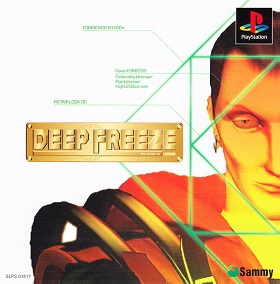
Deep Freeze is a 1999 Japanese video game released for the Sony PlayStation. It is a three-dimensional action-adventure game that was developed by Talon Inc. and published by Sammy. The story focuses on a counter-terrorist unit known as INTER-ANTS.
















